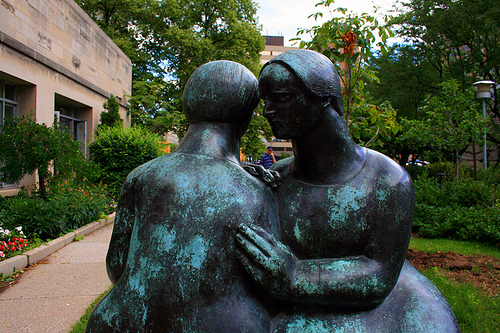Atlas Shrugged, part II, chapter VIII
Happy New Year! If you haven’t already seen it, here’s an article that’s worth a laugh: an Ayn Rand acolyte pens an editorial in the Washington Post explaining how to have a properly selfish Objectivist Christmas, and why the holiday season is really about gratifying your own desires rather than caring for or thinking about the less fortunate.
I think this is my favorite line: “When we wish happy holidays to strangers, that, too, stems from selfishness. It is only because we value our own lives that we can feel benevolent toward others who have the same fundamental nature that we do and who have the potential to share our basic values.” (If they’re really strangers, how do you know if they share your basic values? Shouldn’t the philosophically proper thing be to make strangers fill out a belief-system checklist before judging whether they’re worthy of your “happy holidays”?)
Last time, we left off with Dagny living in self-imposed exile from society in a rural cabin in Woodstock. In her solitude, the one person she pines for is the man she’s been having her adulterous affair with:
There were long, silent evenings when the emotion that made her sit still and look at the unattainable distance beyond the fading light to the south, was loneliness for Hank Rearden. She wanted the sight of his unyielding face, the confident face looking at her with the hint of a smile. But she knew that she could not see him until her battle was won. His smile had to be deserved, it was intended for an adversary who traded her strength against his, not for a pain-beaten wretch who would seek relief in that smile and thus destroy its meaning.
Remember: if you’re feeling lonely, if you’re suffering, or if you’re miserable, the one thing you can never do is go to a loved one for sympathy and comfort. By no means! If you did that, it would “destroy” your relationship with them. Rather, your duty is to hide from your loved ones until you can conjure up the force of will to make yourself feel better.
Sometimes I wonder how anyone could ever have been a follower of Objectivism. Even disregarding the political questions, this philosophy denies something as basic as human compassion. It teaches never to make sacrifices for the people you love or to act with the primary motive of making them happy. You might expect that a trading-based philosophy would at least be able to accommodate the idea that you can turn to a loved one for relief when you’re feeling sad, and they can seek relief from you in turn, but no. Remember that Rand believed that it was impossible to “gain self-esteem from sexual adventures” – which means that if you’re not already happy and content, in her view, you don’t deserve to be loved.
Although she told no one besides Eddie Willers where she was going, she has an unexpected visitor while smoking and listening to the radio one morning:
She was barely aware of a faint noise that came through the music, like the scratching of an old record. The first thing to reach her consciousness was the sudden jerk of her own hand flinging the cigarette aside. It came in the same instant as the realization that the noise was growing loader and that it was the sound of a motor. Then she knew that she had not admitted to herself how much she had wanted to hear that sound, how desperately she had waited for Hank Rearden.
…The car stopped under the arch of branches. She did not recognize it — it was not the black Hammond, but a long, gray convertible. She saw the driver step out: it was a man whose presence here could not be possible. It was Francisco d’Anconia.
He kisses her, aggressively and without asking for her consent (“the sudden harshness of his arms as he seized her… the desperate violence of the way he held her, the hurting pressure of his mouth on hers”). She almost gives in, but then pulls away, reminding herself that he hasn’t been running his business profitably and therefore doesn’t deserve love. Francisco seems amused rather than hurt, saying, “You have a great deal to forgive me, first. But I can tell you everything now.”
He glanced slowly about him, she saw his eyes stop on the path she had built, on the planted flowers, on the fresh-shingled roof. He chuckled, as if he understood and as if it hurt him. “You shouldn’t have been left here for a month,” he said. “God, you shouldn’t have! It’s my first failure, at the one time when I didn’t want to fail. But I didn’t think you were ready to quit. Had I known it, I would have watched you day and night.”
Francisco’s “first” failure – in his entire life, presumably – was his neglecting to stalk Dagny sufficiently closely (“watched you day and night”) to know when she’d walked off the job. As always, she seems to treat this as a perfectly normal thing to say, rather than being creeped out by the idea or telling him that what she does with her life is none of his business. Even though she didn’t want anyone to know where she was, she doesn’t even press him on how he found her, and he doesn’t explain or apologize for intruding.
You’d think that a philosophy based on selfishness and private property would put a higher value on privacy and on consent, but that isn’t the case. As we’ve seen over and over, Rand’s heroines seem to find it unobjectionable and even flattering when men follow them around, pry into their personal lives, and get rough with them without asking permission – basically, behaving like a stalker with a crush.
Image credit: Shaun Merritt, released under CC BY 2.0 license
Other posts in this series:
